2022-12-02T04:36:53Z
Almost three years of pandemic restrictions have been hard for 23-year-old Chinese villager Zu Wenbao, but thanks to Beijing-based Chen’s Studio, music has become his saving grace.
Zu is one of the 14 million people in China who have autism spectrum disorder, a developmental disability caused by differences in the brain. Despite laws to ensure the integration of people with autism, many in China know little about the disorder and support remains lacking, experts say.
Autism has meant Zu was unable to fit in at school or among other young people in his home village of Bei’an in northeast China’s Heilongjiang Province. All that changed when he started learning music free of charge at Chen’s Studio, which started lessons for people with autism just as the pandemic began.
Zu, who is non-verbal, joined the five-studio Beijing school in 2020. He has since learned to play the keyboard, and sings along with the four other members of the “Star Kids” band their teacher, Chen Shensi, set up last year for people with autism.
Please click here for a photo package.
“Without music, without these lessons, he wouldn’t have anything,” said Zu’s mother, Zhao Guorong, who travels with her son every Sunday for two hours on three different buses from their current home on the outskirts of Beijing so that he can attend class.
“The village youngsters all go to work or school, so without music and the band, he wouldn’t have any peers to socialise with,” she added. “Even though the kids taking music classes are younger than him and half his size, they all take care of him like he’s their brother.”
China has passed several laws to ensure inclusion of people with autism, most recently in September to standardize autism screening, diagnosis and intervention for young children.
While support has improved over the past 20 years, millions of children still lack the behavioural therapy and educational support they need, experts say.
People with autism tend to find it difficult to get jobs, and the music school’s founder Chen hopes he can change that by giving his students a way to earn a living: the Star Kids band has already performed several concerts at events held at camp sites on the outskirts of Beijing.
Chen says he knew very little about autism before he started teaching a bass player with the disorder in 2020.
When COVID-19 lockdowns and restrictions on movement curtailed his regular music lessons, Chen started the free-of-charge lessons for people with autism. “COVID has been hard, and I wanted to do as much as I can to give them joy through music,” he said.
Chen admits he was very frustrated at first with his students because he had to repeat himself many times. Disciplining the class was also tough, but eventually, the students started communicating better with him and each other.
“It’s just difficult for them to communicate normally with other people, let along work in a typical job, but they might be able to make a living by being an artist,” he said.
“To some degree, I think music might be their language.”
Related Galleries:
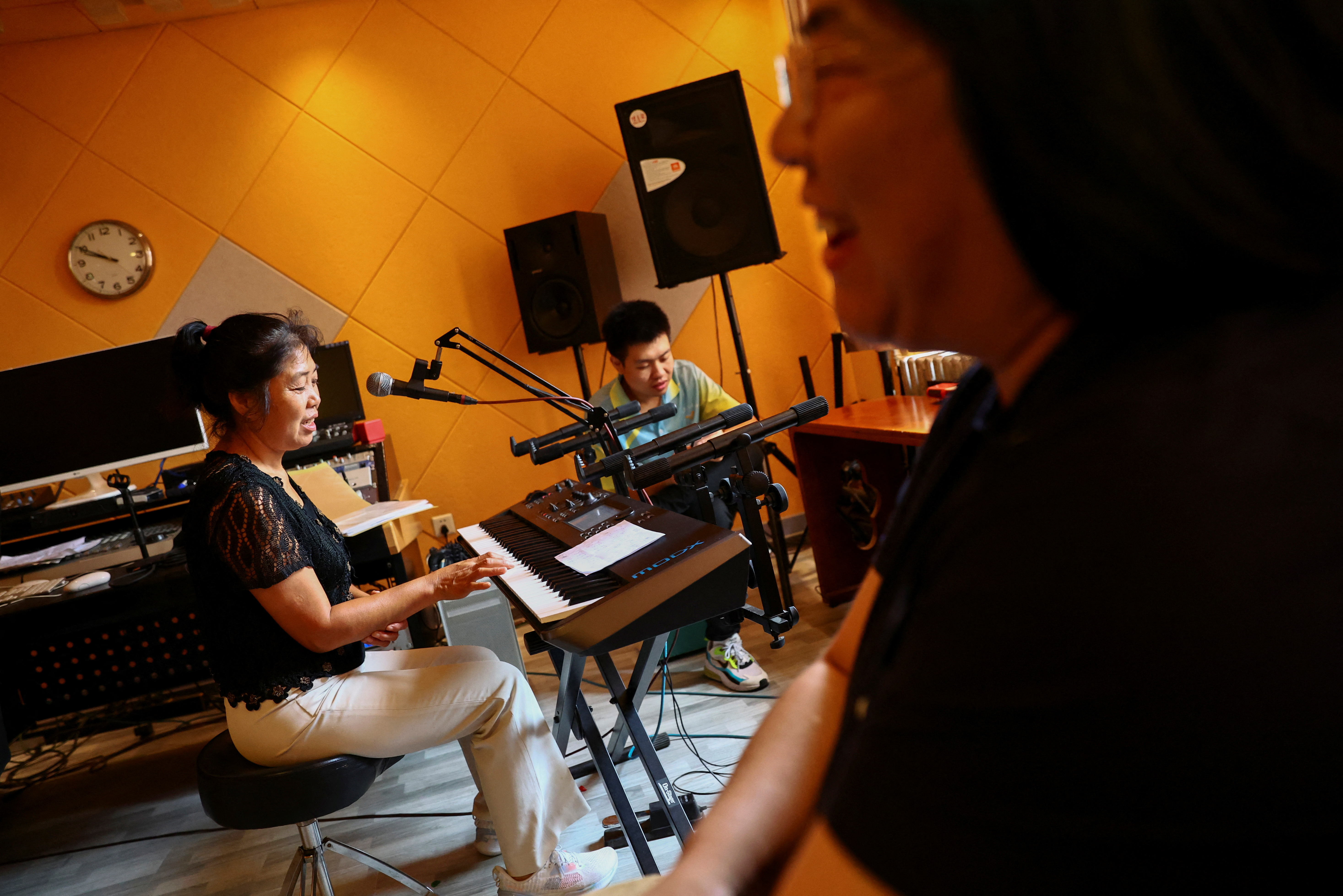
Zhao Guorong, 59, plays the keyboard as she performs with her son Zu Wenbao, 23, and Tian Yi, 44, during a practice session of the band formed by the mothers of Star Kids, called Mums of Star Kids, at the music studio of 38-year-old teacher Chen Shensi in Beijing, China August 21, 2022. Almost three years of pandemic restrictions have been especially hard for Zu, who has autism spectrum disorder, but thanks to Chen’s Studio, music has become his saving grace. REUTERS/Tingshu Wang

Zu Wenbao, 23, and his mother Zhao Guorong, 59, eat dumplings for lunch at their home on the outskirts of Beijing, China September 8, 2022. Zu is one of the 14 million people in China who have autism spectrum disorder, a developmental disability caused by differences in the brain. Despite laws to ensure the integration of people with autism, many in China know little about the disorder and support remains lacking, experts say. REUTERS/Tingshu Wang
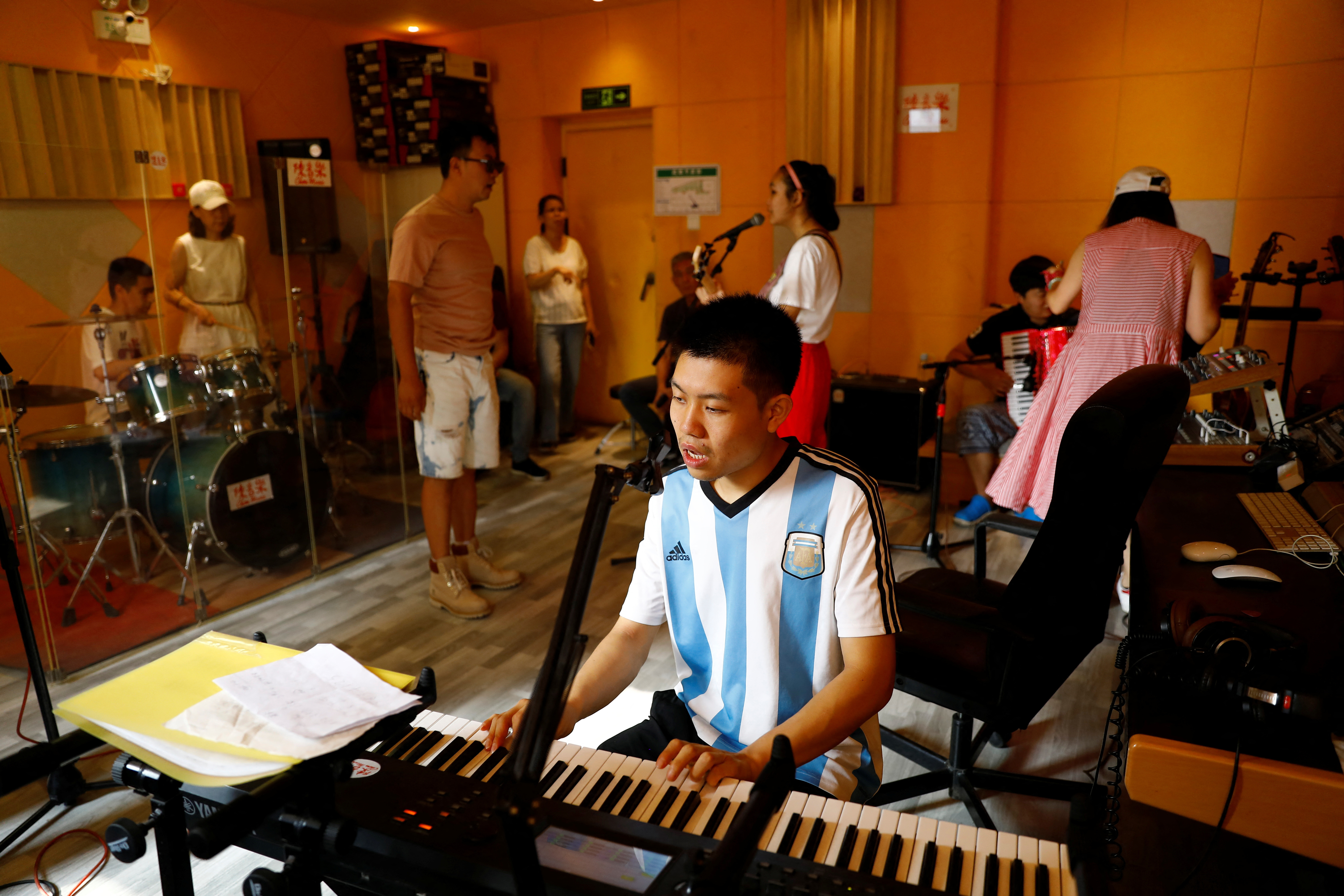
Zu Wenbao, 23, plays the keyboard during a practice session with his band Star Kids, who like him are all adults with autism spectrum disorder, at a music studio belonging to 38-year-old teacher Chen Shensi in Beijing, China July 31, 2022. “Without music, without these lessons, he wouldn’t have anything,” said Zu’s mother, Zhao Guorong, who travels with her son every Sunday for two hours on three different buses to Beijing so that he can attend class. REUTERS/Tingshu Wang
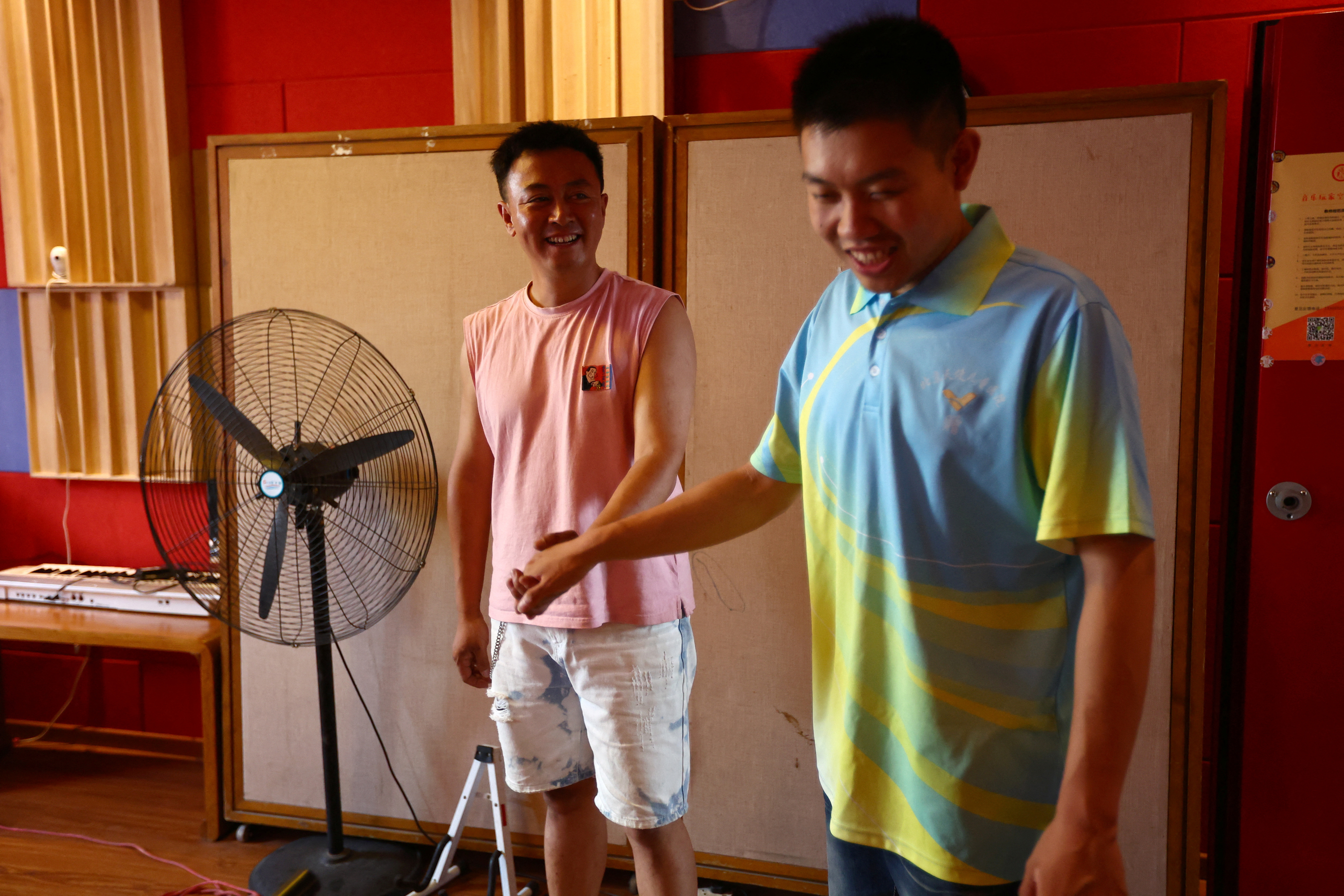
Teacher Chen Shensi, 38, talks with Zu Wenbao, 23, during a practice session with members of Zu’s band Star Kids, who like him are all adults with autism spectrum disorder, at Chen’s music studio in Beijing, China September 11, 2022. Zu, who is non-verbal, started learning music free of charge at Chen’s Studio, which started lessons for people with autism just as the pandemic began. He has since learned to play the keyboard, and sings along with the four other members of the Star Kids band their teacher, Chen, set up last year for people with autism. REUTERS/Tingshu Wang
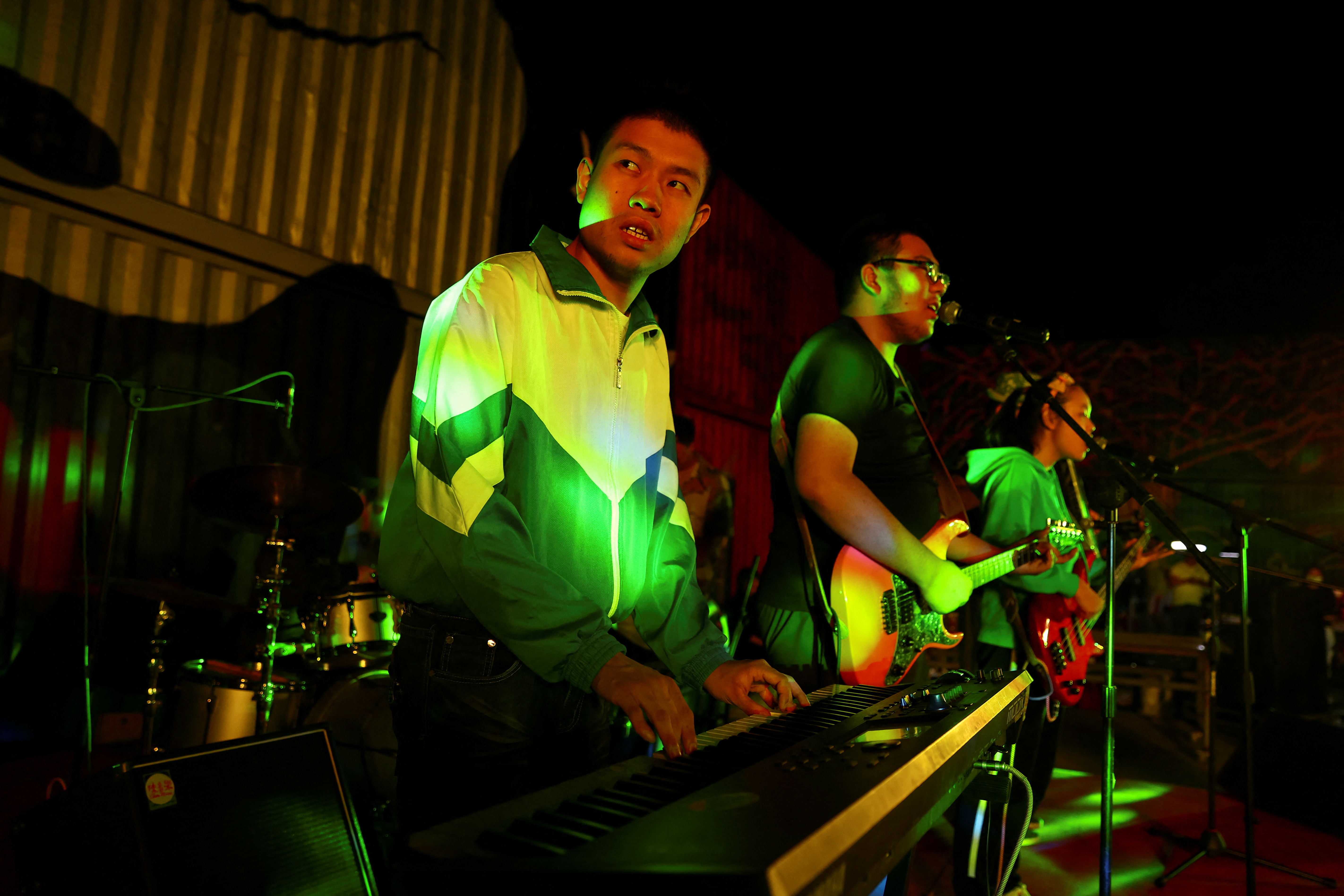
Zu Wenbao, 23, plays the keyboard as he performs with members of his band Star Kids, who like him are all adults with autism spectrum disorder, at a market fair in Beijing, China September 24, 2022. Zu, who is non-verbal, started learning music free of charge at Chen’s Studio, which started lessons for people with autism just as the pandemic began. He has since learned to play the keyboard, and sings along with the four other members of the Star Kids band their teacher, Chen Shensi, set up last year for people with autism. REUTERS/Tingshu Wang

Zu Wenbao, 23, and Wu Jiayu, 18, who have autism spectrum disorder, sing as they perform onstage with the band My World, which is mostly made up of children aged around ten years old, at Beijing Eco Valley Smart Farm, a farm and campsite in Beijing, China September 3, 2022. “The village youngsters all go to work or school, so without music and the band, he wouldn’t have any peers to socialise with,” Zu’s mother, Zhao Guorong, said. “Even though the kids taking music classes are younger than him and half his size, they all take care of him like he’s their brother.” REUTERS/Tingshu Wang
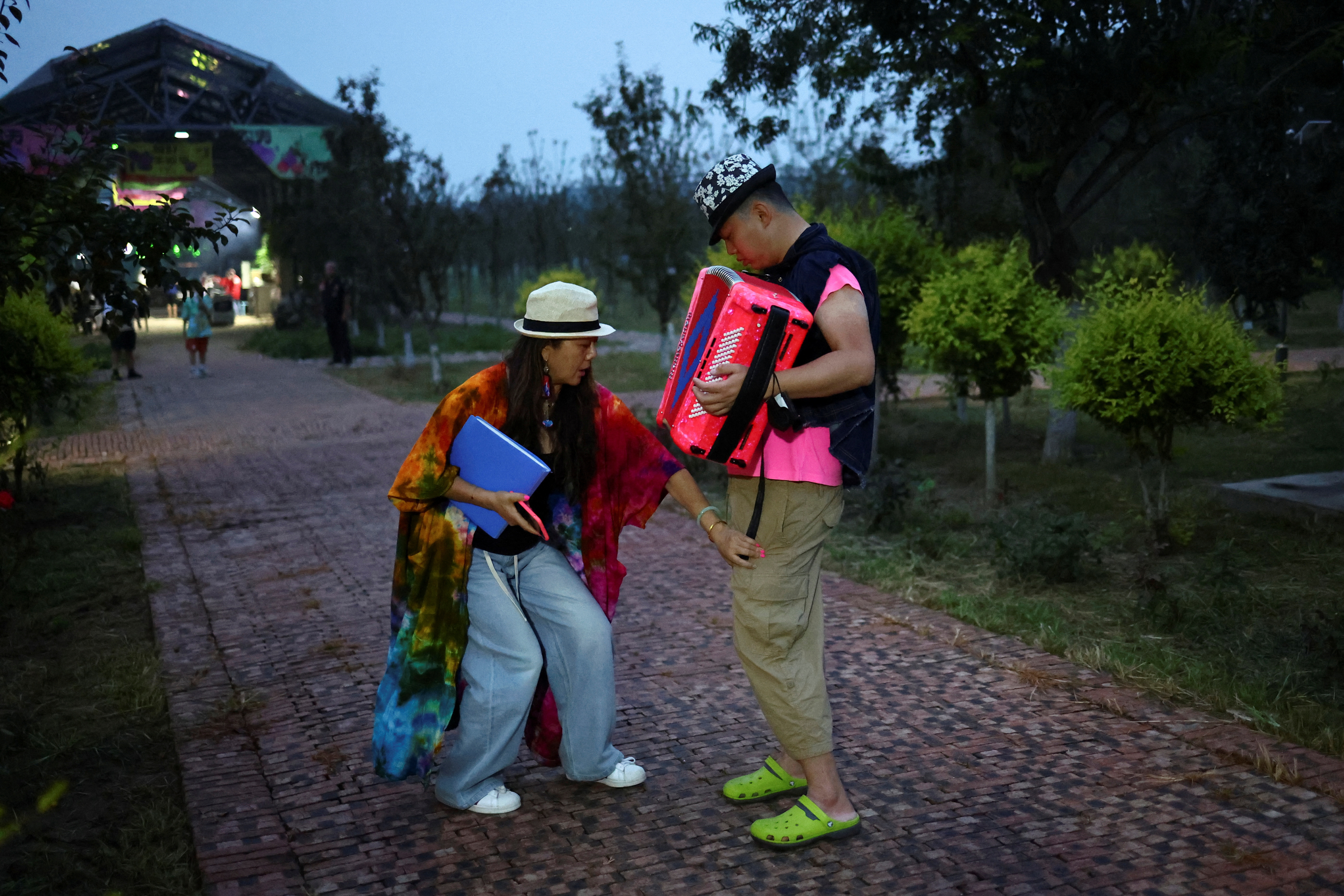
Flora Tan guides her son Jackie Zheng, 29, as he practices the accordion before a performance onstage with his band Star Kids, who like him are all adults with autism spectrum disorder, at Beijing Eco Valley Smart Farm, a farm and campsite in Beijing, China September 3, 2022. “It’s just difficult for them to communicate normally with other people, let along work in a typical job, but they might be able to make a living by being an artist,” Zheng’s music teacher Chen Shensi said. “To some degree, I think music might be their language.” REUTERS/Tingshu Wang

Music teacher Chen Shensi, 38, encourages Zu Wenbao, 23, Wu Jiayu, 18, and Wang Boya, 30, to dance as they wait to perform onstage with their band Star Kids, who are all adults with autism spectrum disorder, at Renji Hotel, a campsite on the outskirts of Beijing, China September 11, 2022. Zu, who is non-verbal, started learning music free of charge at Chen’s Studio, which started lessons for people with autism just as the pandemic began. He has since learned to play the keyboard, and sings along with the four other members of the Star Kids band their teacher, Chen Shensi, set up last year for people with autism. REUTERS/Tingshu Wang
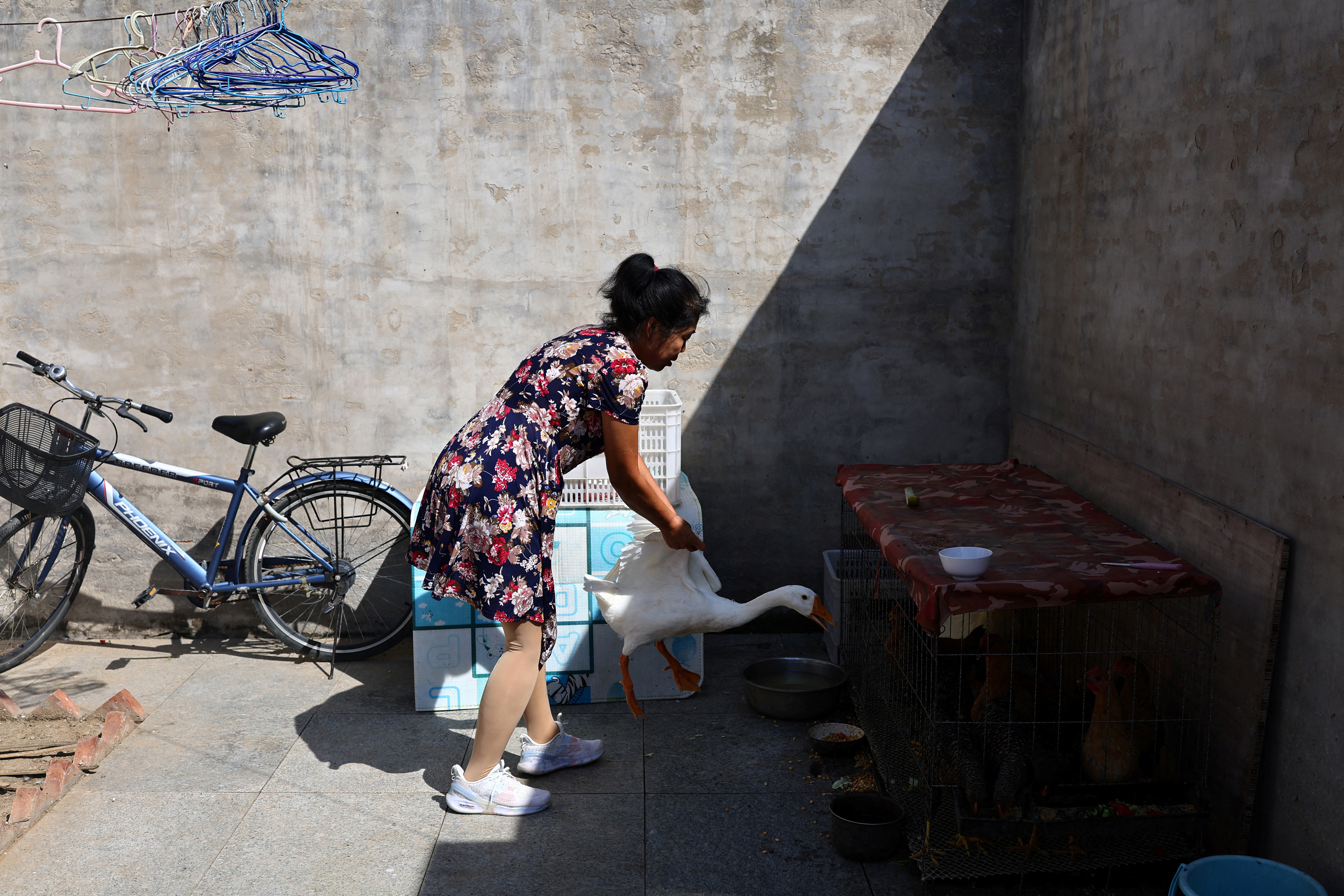
Zhao Guorong, 59, grabs a goose to put it back into its cage at her home on the outskirts of Beijing, China September 8, 2022. Zhao travels with her son, 23-year-old Zu Wenbao who has autism spectrum disorder, every Sunday for two hours on three different buses to Beijing so that he can attend class at Chen’s Studio, which started lessons for people with autism just as the pandemic began. REUTERS/Tingshu Wang
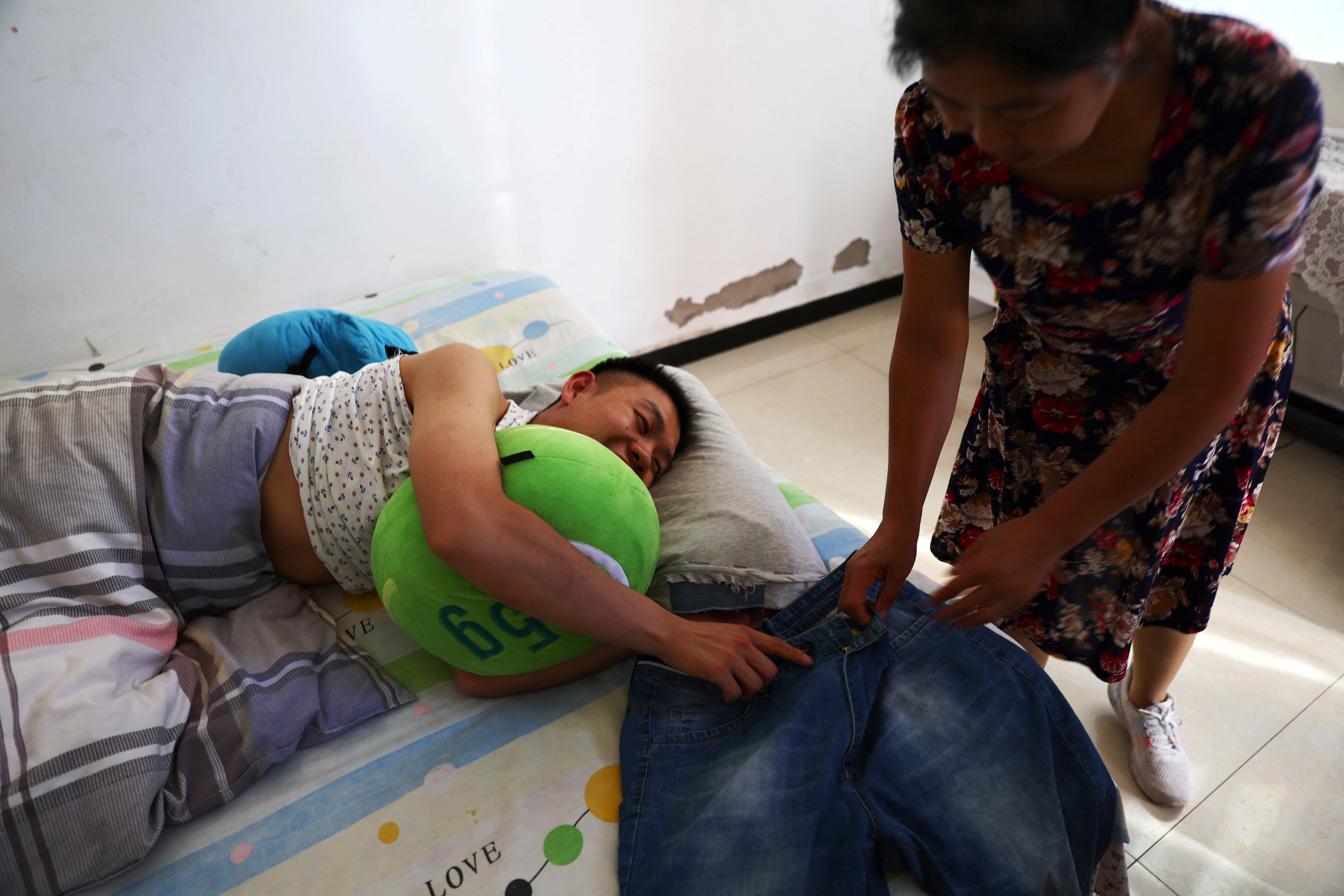
Zu Wenbao, 23, lies on bed as his mother Zhao Guorong, 59, prepares trousers for him to wear at their home on the outskirts of Beijing, China September 8, 2022. Zu is one of the 14 million people in China who have autism spectrum disorder, a developmental disability caused by differences in the brain. Despite laws to ensure the integration of people with autism, many in China know little about the disorder and support remains lacking, experts say. REUTERS/Tingshu Wang

Zu Wenbao, 23, helps his mother Zhao Guorong, 59, by removing corn kernels at their home on the outskirts of Beijing, China September 8, 2022. Zu is one of the 14 million people in China who have autism spectrum disorder, a developmental disability caused by differences in the brain. Despite laws to ensure the integration of people with autism, many in China know little about the disorder and support remains lacking, experts say. REUTERS/Tingshu Wang
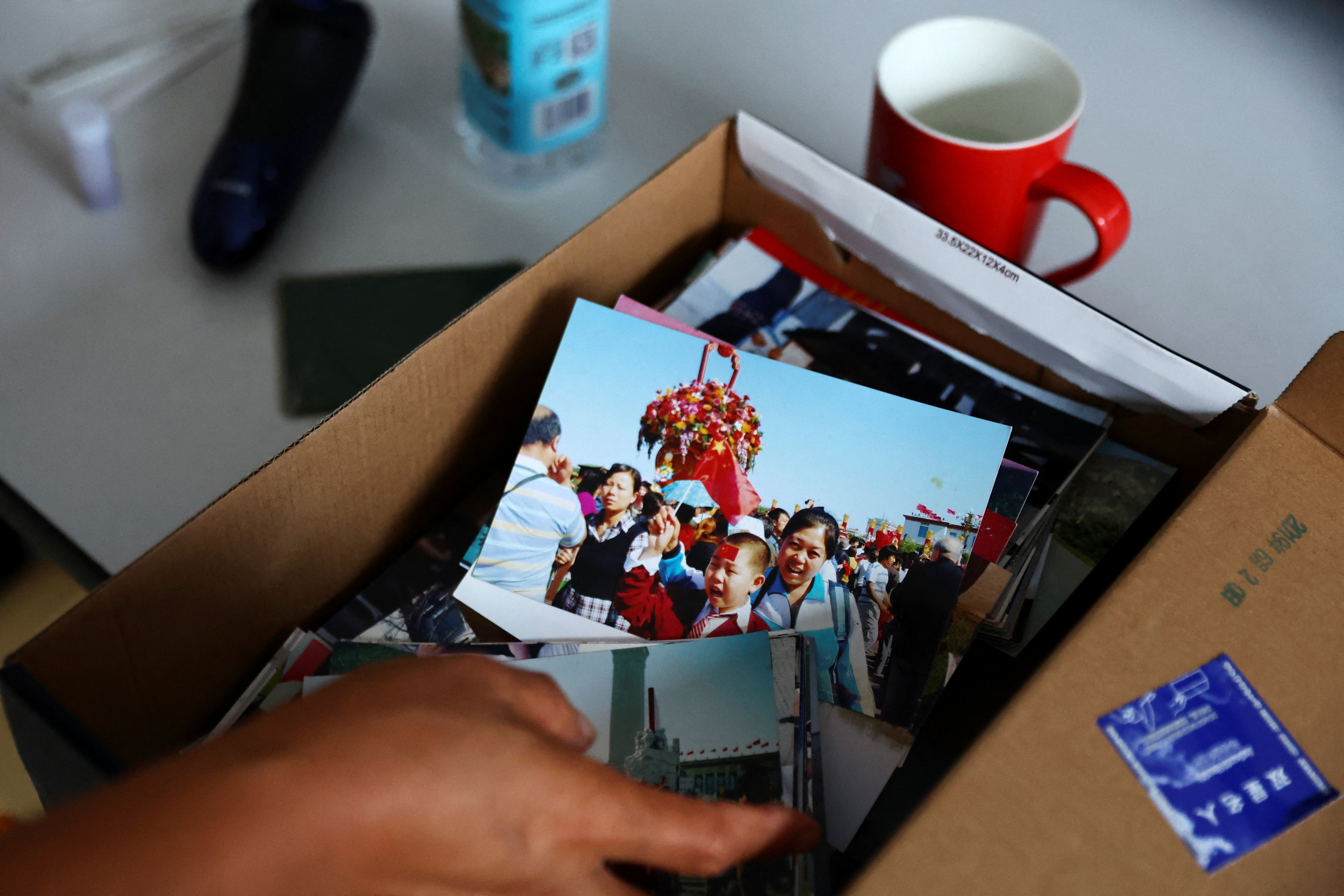
Zhao Guorong, 59, shows a photograph of her with her son Zu Wenbao, then aged 10, at Tiananmen Square on a National Day holiday, at their home on the outskirts of Beijing, China August 21, 2022. Zu is one of the 14 million people in China who have autism spectrum disorder, a developmental disability caused by differences in the brain. Despite laws to ensure the integration of people with autism, many in China know little about the disorder and support remains lacking, experts say. REUTERS/Tingshu Wang
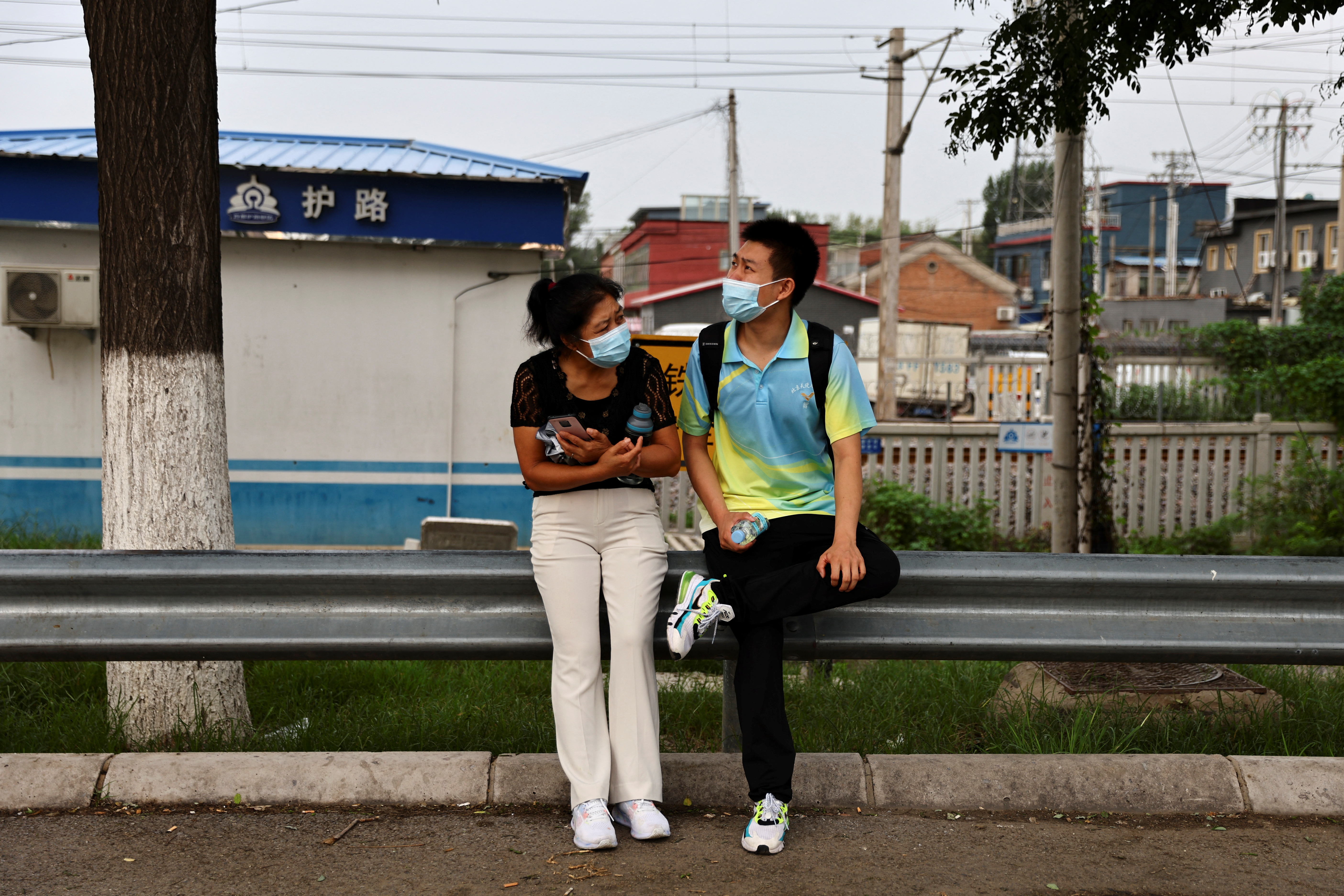
Zu Wenbao, 23, and his mother Zhao Guorong, 59, wait for a bus on the way to the music studio of 38-year-old music teacher Chen Shensi, for a practice session with members of Zu’s band Star Kids, who like him are all adults with autism spectrum disorder, in Beijing, China August 21, 2022. “Without music, without these lessons, he wouldn’t have anything,” said Zhao Guorong, who travels with her son every Sunday for two hours on three different buses to Beijing so that he can attend class. REUTERS/Tingshu Wang

Zu Wenbao, 23, rides on a bus going to a practice session with his band Star Kids, who like him are all adults with autism spectrum disorder, at the music studio of 38-year-old teacher Chen Shensi, in Beijing, China September 11, 2022. Zu is one of the 14 million people in China who have autism spectrum disorder, a developmental disability caused by differences in the brain. Despite laws to ensure the integration of people with autism, many in China know little about the disorder and support remains lacking, experts say. REUTERS/Tingshu Wang
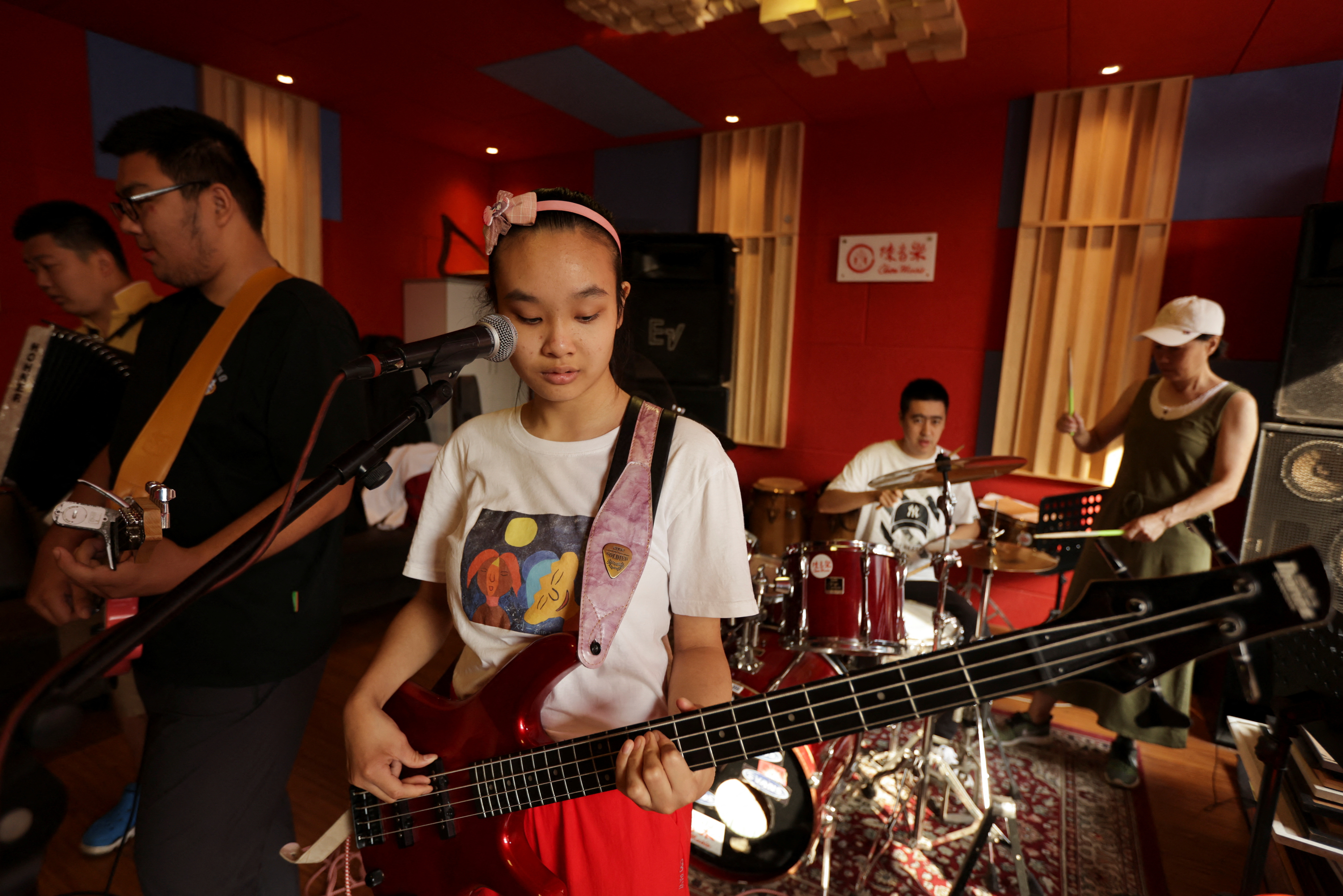
Wu Jiayu, 18, plays the bass during a practice session with members of her band Star Kids, who like her are all adults with autism spectrum disorder, at a music studio belonging to 38-year-old teacher Chen Shensi, in Beijing, China September 18, 2022. “It’s just difficult for them to communicate normally with other people, let along work in a typical job, but they might be able to make a living by being an artist,” Chen said. “To some degree, I think music might be their language.” REUTERS/Tingshu Wang

Zu Wenbao, 23, reacts to a loud sound by covering his ears while his mother Zhao Guorong, 59, plays the keyboard during a practice session of the band formed by the mothers of Star Kids, called Mums of Star Kids, at the music studio of 38-year-old teacher Chen Shensi in Beijing, China July 31, 2022. Almost three years of pandemic restrictions have been especially hard for Zu, who has autism spectrum disorder, but thanks to Chen’s Studio, music has become his saving grace. REUTERS/Tingshu Wang
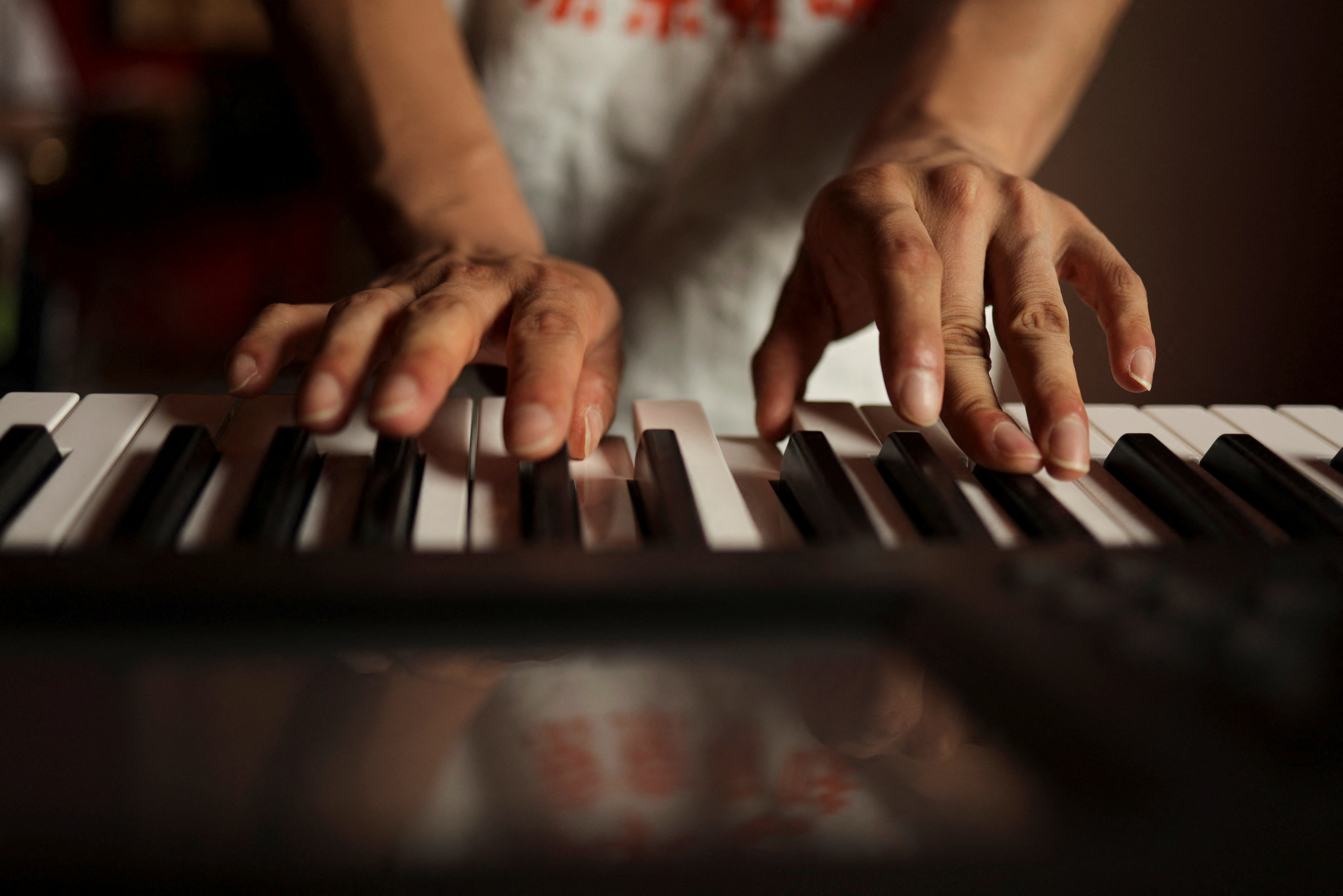
Zu Wenbao, 23, plays keyboard during a practice session with members of the band Star Kids, who like him are all adults with autism spectrum disorder, at a music studio belonging to 38-year-old teacher Chen Shensi, in Beijing, China September 18, 2022. Zu, who is non-verbal, started learning music free of charge at Chen’s Studio, which started lessons for people with autism just as the pandemic began. He has since learned to play the keyboard, and sings along with the four other members of the Star Kids band their teacher, Chen, set up last year for people with autism. REUTERS/Tingshu Wang
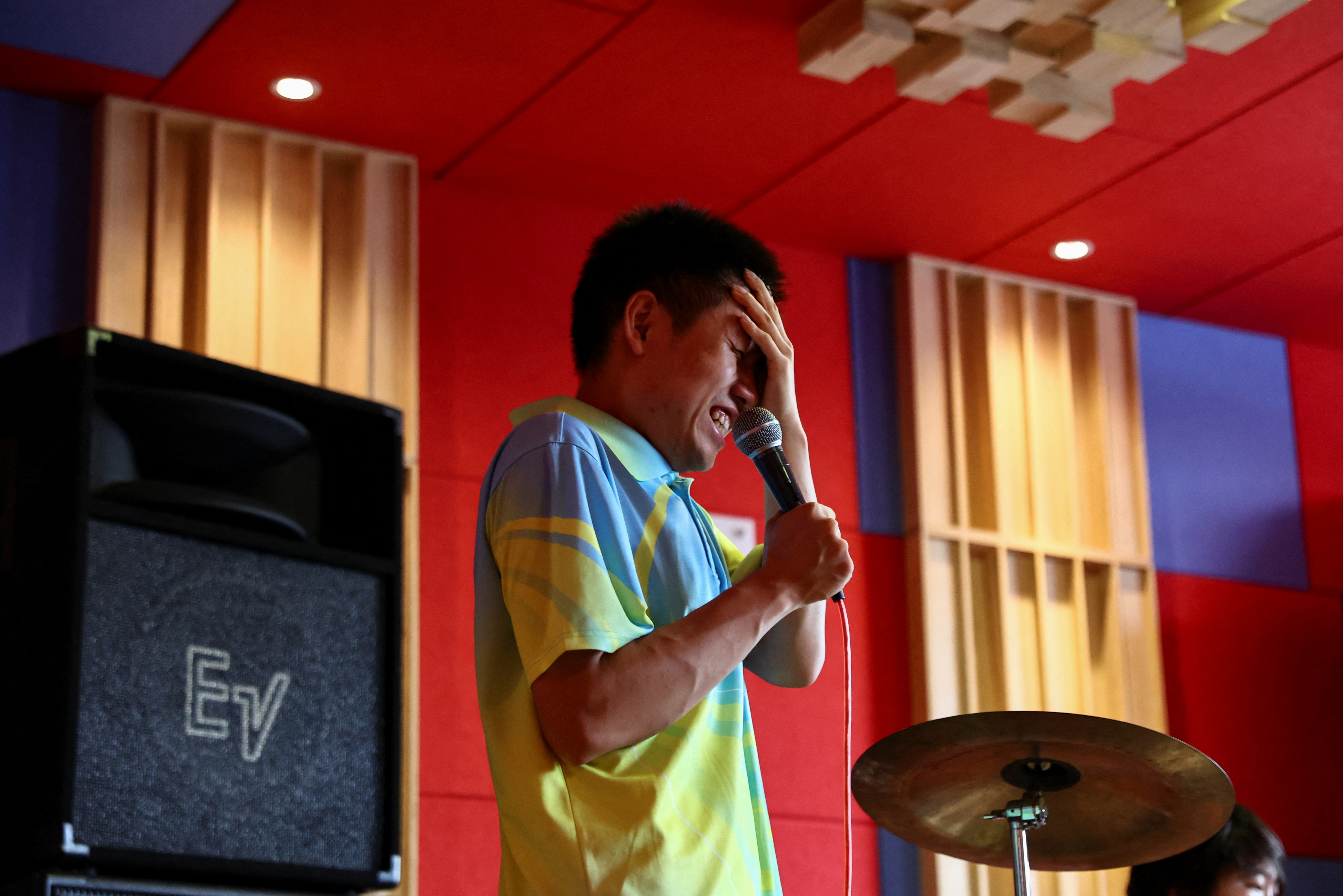
Zu Wenbao, 23, who has autism spectrum disorder, sings with the band My World, which is mostly made up of children aged around ten years old, during a practice session, at the music studio of 38-year-old teacher Chen Shensi, Beijing, China August 21, 2022. “The village youngsters all go to work or school, so without music and the band, he wouldn’t have any peers to socialise with,” Zu’s mother, Zhao Guorong, said. “Even though the kids taking music classes are younger than him and half his size, they all take care of him like he’s their brother.” REUTERS/Tingshu Wang

Zu Wenbao, 23, rests after a practice session with members of his band Star Kids, who like him are all adults with autism spectrum disorder, at the music studio of 38-year-old teacher Chen Shensi in Beijing, China September 11, 2022. Zu, who is non-verbal, started learning music free of charge at Chen’s Studio, which started lessons for people with autism just as the pandemic began. He has since learned to play the keyboard, and sings along with the four other members of the Star Kids band their teacher, Chen, set up last year for people with autism. REUTERS/Tingshu Wang
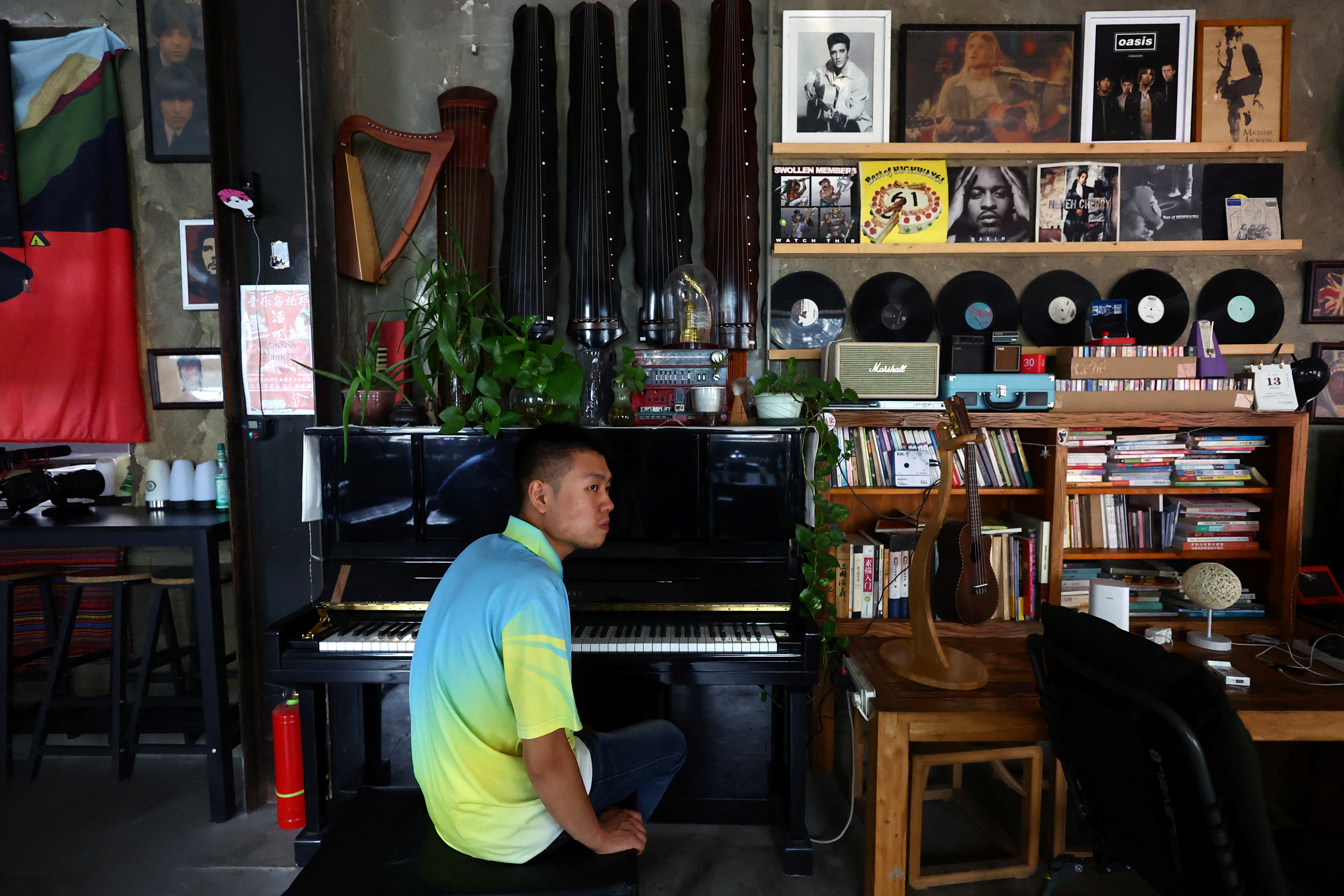
Zu Wenbao, 23, sits in front of a piano during a break from a practice session with his band Star Kids, who like him are all adults with autism spectrum disorder, at the music studio of 38-year-old teacher Chen Shensi, in Beijing, China September 11, 2022. Zu, who is non-verbal, started learning music free of charge at Chen’s Studio, which started lessons for people with autism just as the pandemic began. He has since learned to play the keyboard, and sings along with the four other members of the Star Kids band their teacher, Chen, set up last year for people with autism. REUTERS/Tingshu Wang

Zu Wenbao, 23, attends a chorus session at Xing Guang Yi Cai (“Radiant Starlight”), a charity which provides art and music lessons for people with autism spectrum disorder in Beijing, China, September 18, 2022. Zu is one of the 14 million people in China who have autism spectrum disorder, a developmental disability caused by differences in the brain. REUTERS/Tingshu Wang

Zu Wenbao, 23, gestures as if he is holding a microphone during a band practice session, at Xing Guang Yi Cai (“Radiant Starlight”), a charity which provides art and music lessons for people with autism spectrum disorder, in Beijing, China September 18, 2022. Zu is one of the 14 million people in China who have autism spectrum disorder, a developmental disability caused by differences in the brain. REUTERS/Tingshu Wang
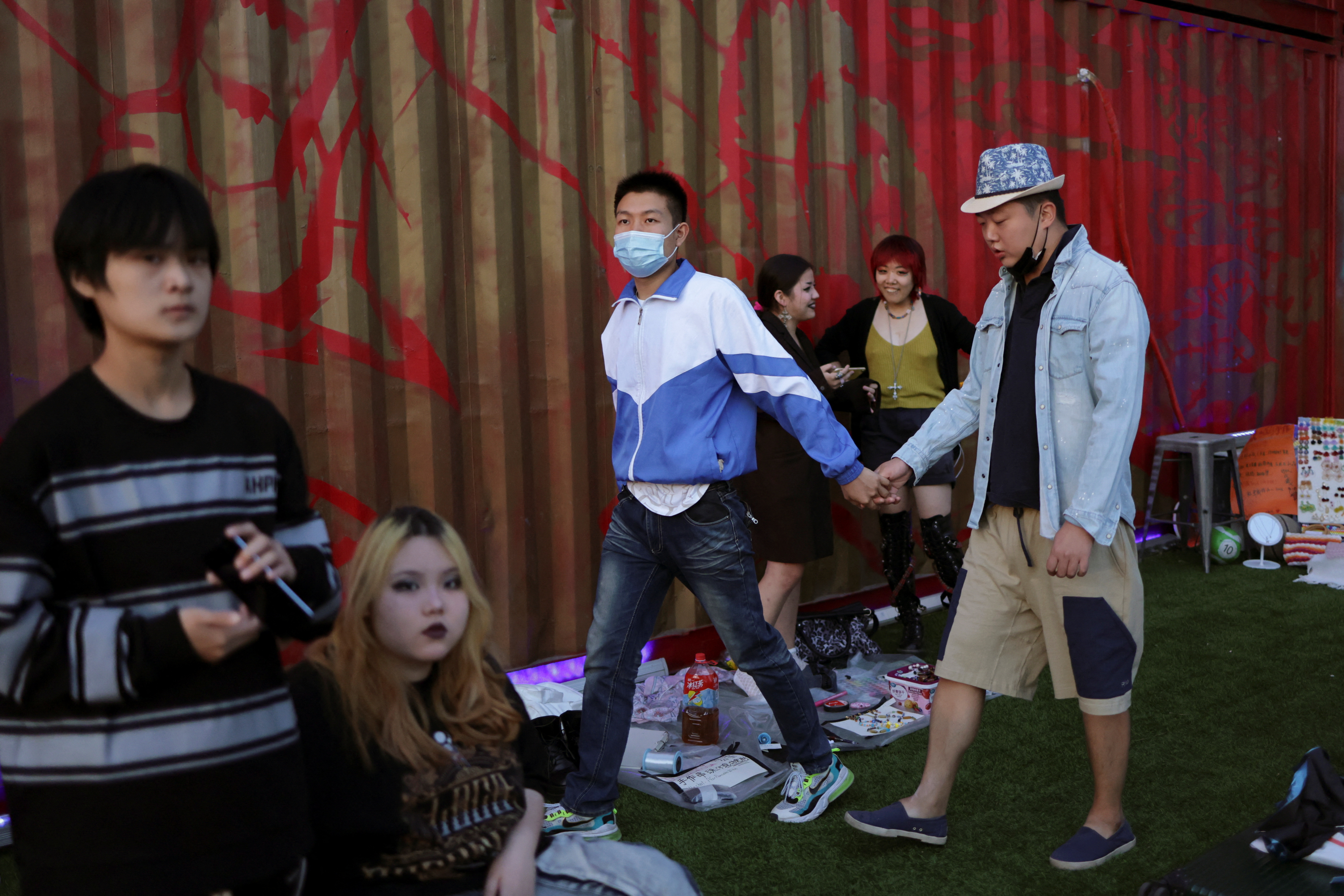
Zu Wenbao, 23, holds hands with Jackie Zheng, 29, as they walk through booths at a market fair before their performance onstage with members of their band Star Kids, who like them are all adults with autism spectrum disorder, in Beijing, China September 24, 2022. Zu, who is non-verbal, started learning music free of charge at Chen’s Studio, which started lessons for people with autism just as the pandemic began. He has since learned to play the keyboard, and sings along with the four other members of the Star Kids band their teacher, Chen Shensi, set up last year for people with autism. REUTERS/Tingshu Wang
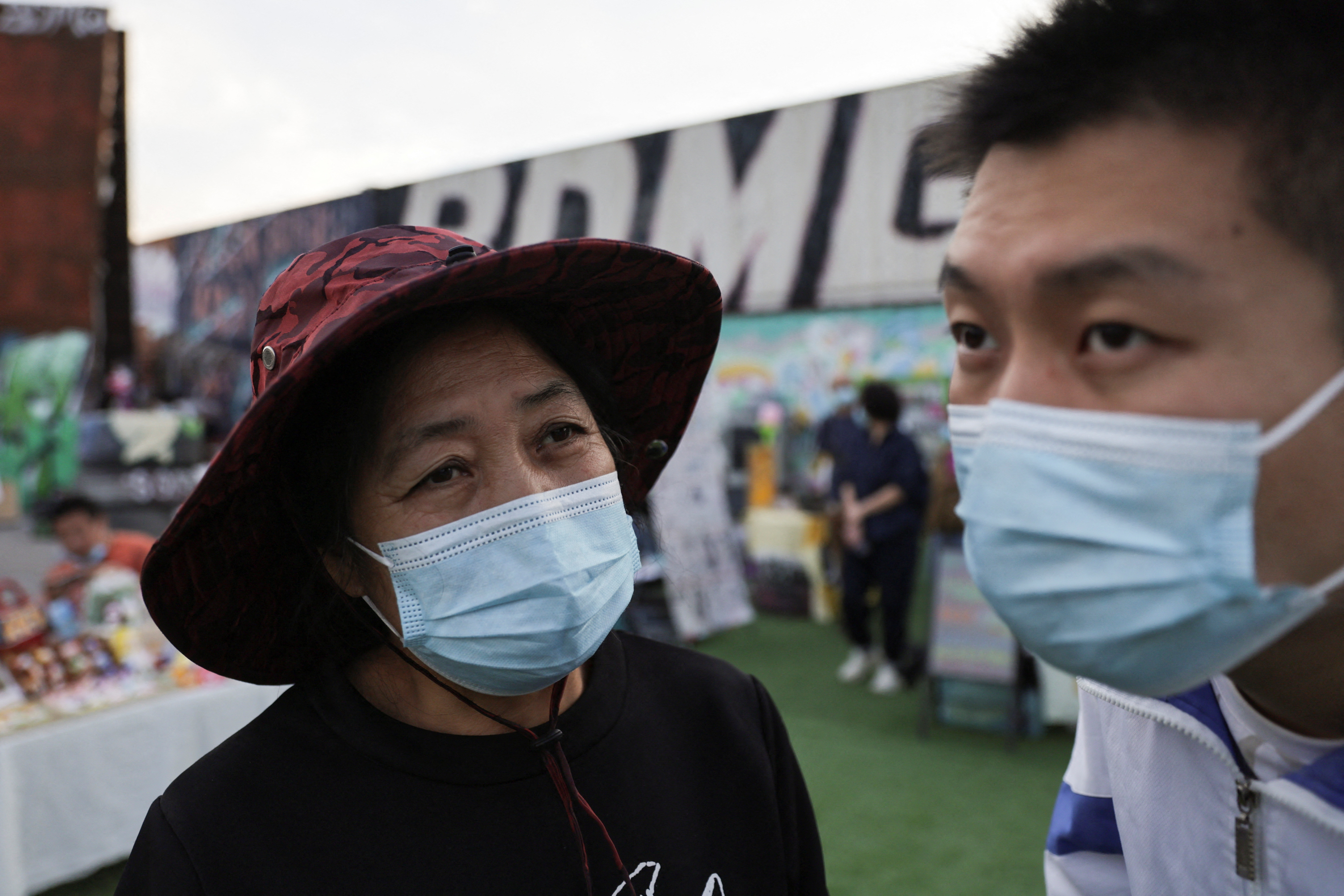
Zu Wenbao, 23, stands as his mother Zhao Guorong, 59, talks to him at a market fair before his performance onstage with members of his band Star Kids, who like him are all adults with autism spectrum disorder, in Beijing, China September 24, 2022. Zu is one of the 14 million people in China who have autism spectrum disorder, a developmental disability caused by differences in the brain. Despite laws to ensure the integration of people with autism, many in China know little about the disorder and support remains lacking, experts say. REUTERS/Tingshu Wang
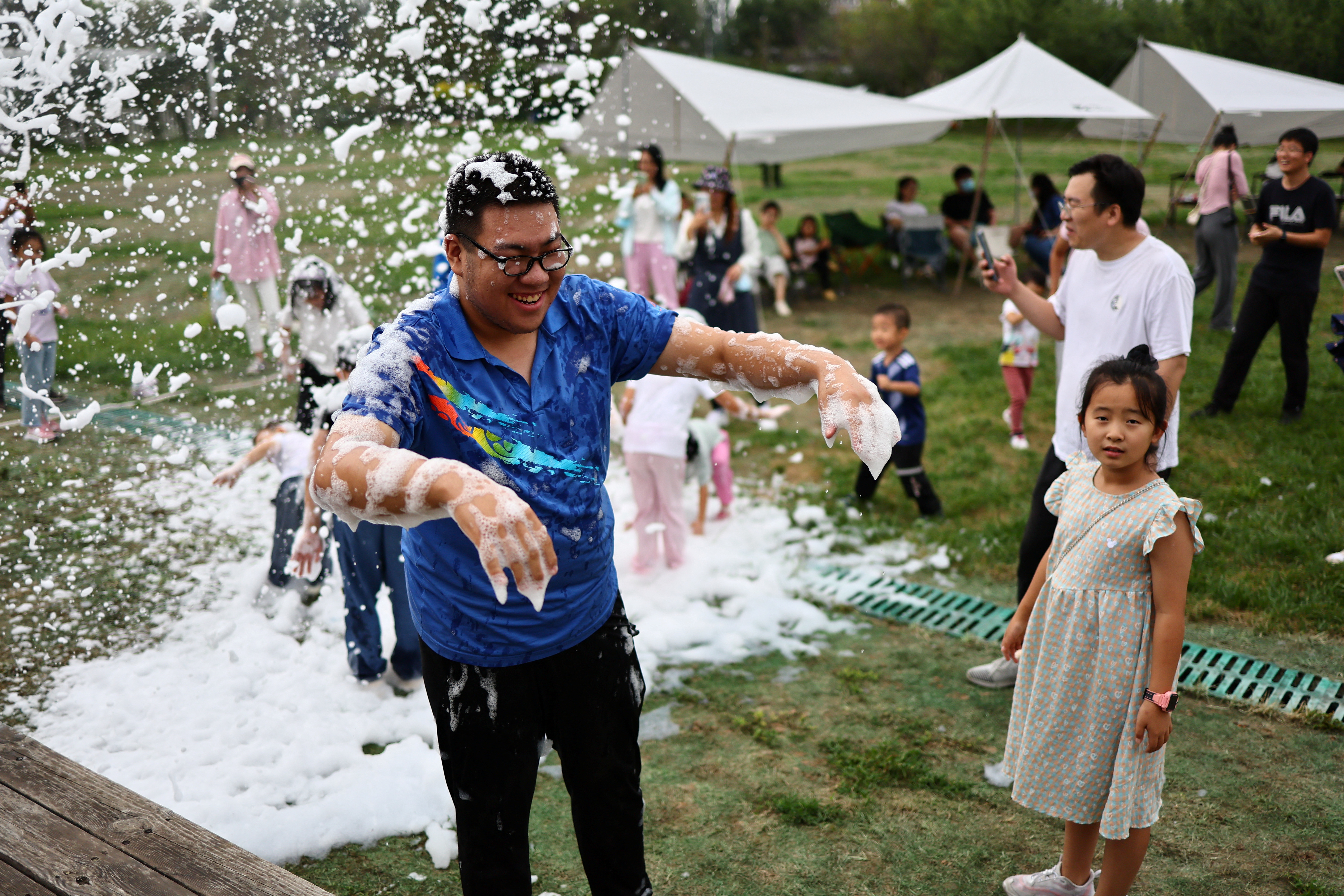
Siqi, 19, plays with bubbles before a performance onstage with his band Star Kids, who like him are all adults with autism spectrum disorder, at Beijing Eco Valley Smart Farm, a farm and campsite in Beijing, China September 3, 2022. “It’s just difficult for them to communicate normally with other people, let along work in a typical job, but they might be able to make a living by being an artist,” Siqi’s music teacher Chen Shensi said. “To some degree, I think music might be their language.” REUTERS/Tingshu Wang
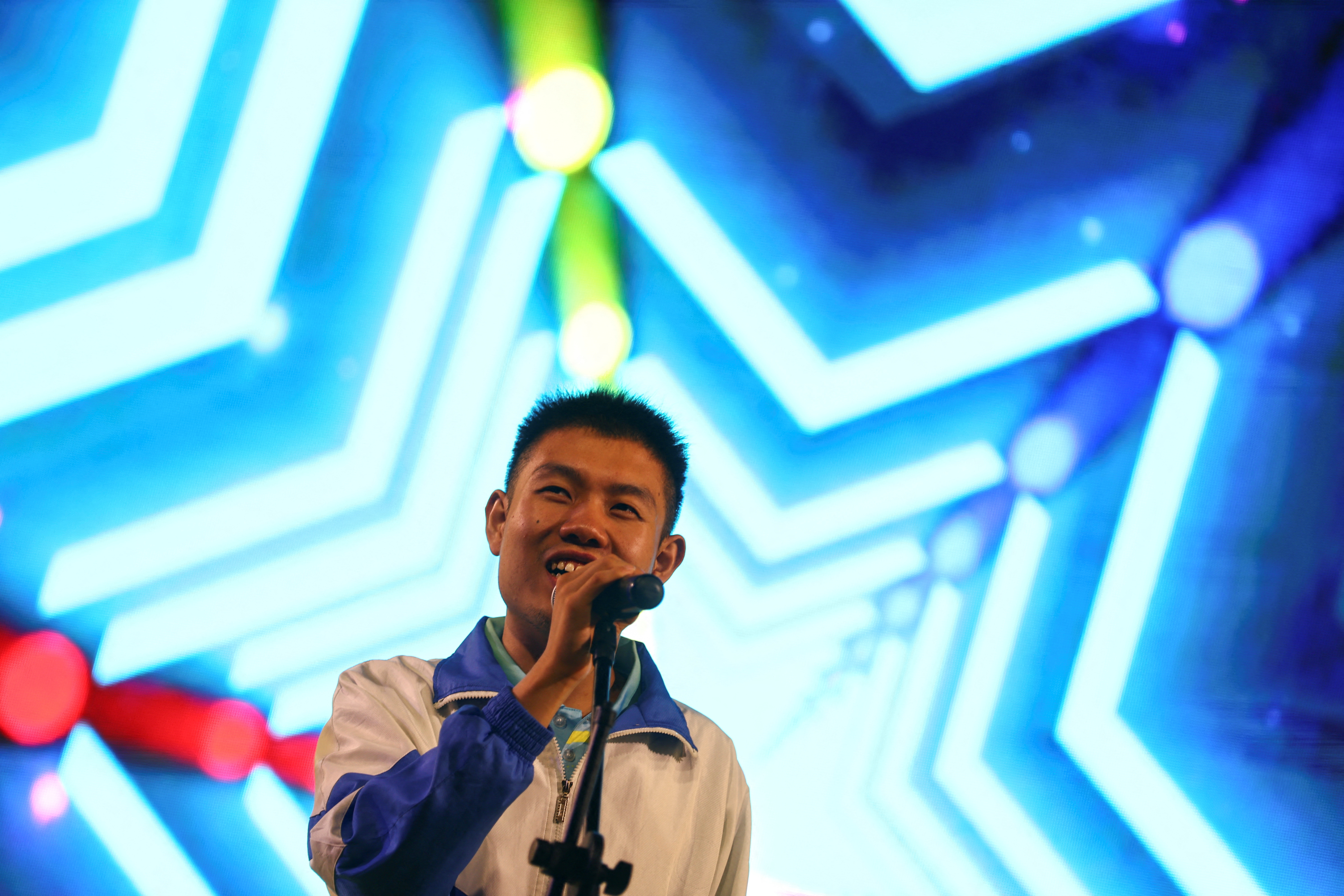
Zu Wenbao, 23, sings onstage during a performance at Renji Hotel, a campsite on the outskirts of Beijing, China September 11, 2022. Zu, who is non-verbal, started learning music free of charge at Chen’s Studio, which started lessons for people with autism just as the pandemic began. He has since learned to play the keyboard, and sings along with the four other members of the Star Kids band their teacher, Chen Shensi, set up last year for people with autism. REUTERS/Tingshu Wang
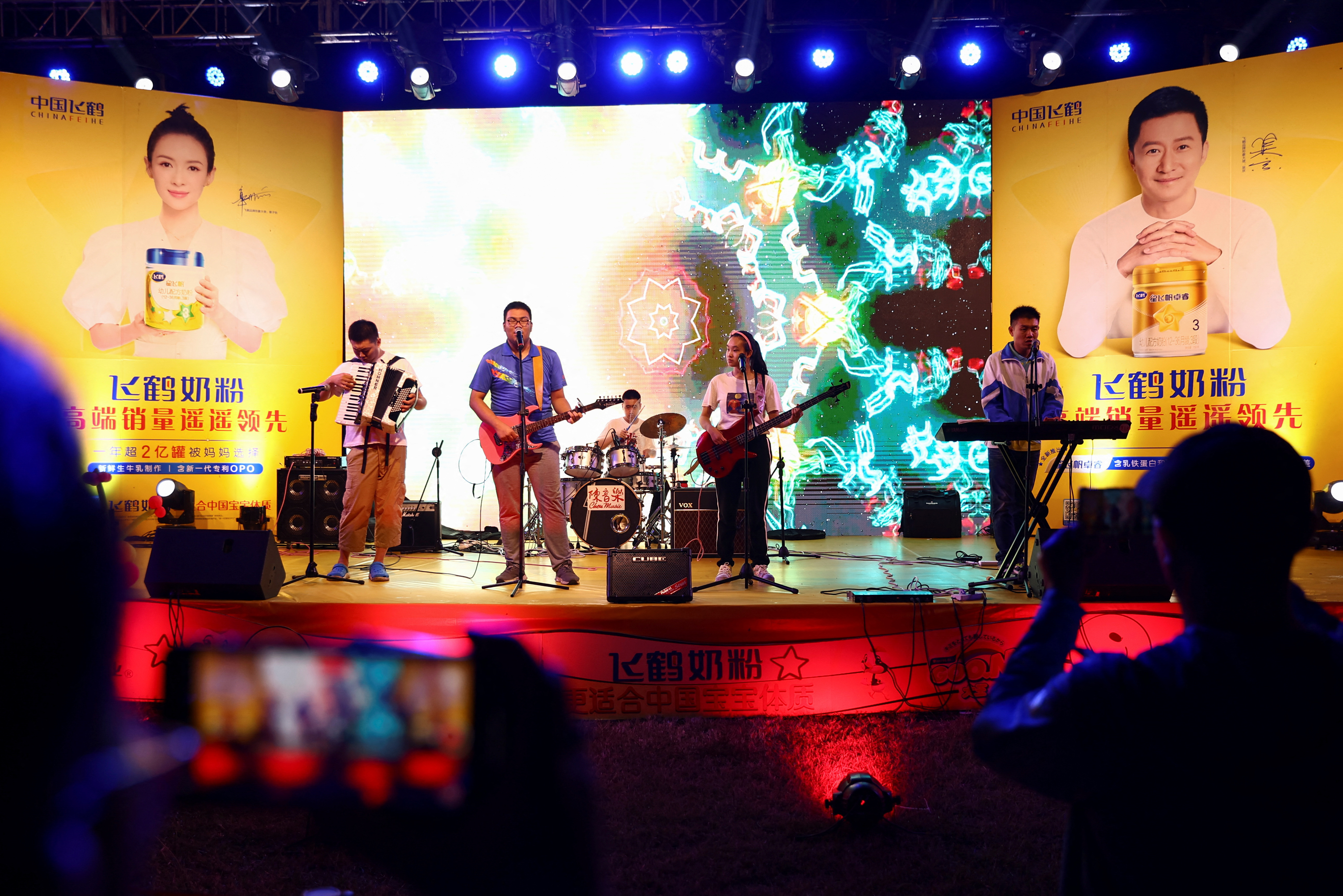
Zu Wenbao, 23, and members of his band Star Kids, who like him are all adults with autism spectrum disorder, perform onstage at Renji Hotel, a campsite on the outskirts of Beijing, China September 11, 2022. Zu, who is non-verbal, started learning music free of charge at Chen’s Studio, which started lessons for people with autism just as the pandemic began. He has since learned to play the keyboard, and sings along with the four other members of the Star Kids band their teacher, Chen Shensi, set up last year for people with autism. REUTERS/Tingshu Wang

Members of the band Star Kids, Zu Wenbao, 23, Wu Jiayu, 18, Jackie Zheng, 29, Siqi, 19, and Wang Boya, 30, who are adults with autism spectrum disorder, perform onstage at a market fair in Beijing, China September 24, 2022. Zu, who is non-verbal, started learning music free of charge at Chen’s Studio, which started lessons for people with autism just as the pandemic began. He has since learned to play the keyboard, and sings along with the four other members of the Star Kids band their teacher, Chen Shensi, set up last year for people with autism. REUTERS/Tingshu Wang





























